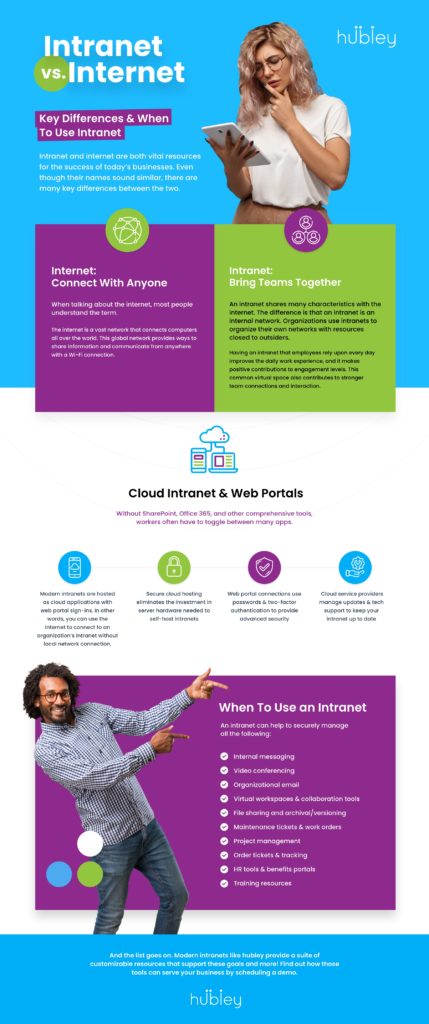When it comes to networks, two terms arise, intranet and internet. Let’s differentiate the two. These two technological pillars have similar names but serve distinct roles. Each network has its functions, applications, and impacts on business operations.
To harness the power of these networks, business owners and managers must first understand what separates them. So, what is the difference between the internet and an intranet?
What Is an Intranet?
The internet has become such a vital part of our lives, it’s hard to imagine a world without it. It’s where we communicate, learn, and play, with endless information at our fingertips. The internet has become our go-to, from social media to online shopping sprees. With its popularity increasing at an unprecedented rate, it’s clear that the internet is here to stay.
An intranet, in comparison, works off the same base concept. The difference is that it has no external functions and does not allow users outside its network to connect. Whereas anyone can access a public website, only authorized business users can log into an intranet’s applications and sites.
Since business users have remote access to resources and communication platforms in a familiar format, a well-established intranet acts as a secure environment for the following processes:
- Collaboration
- Company updates
- Data Sharing
- Employee engagement
- Resources
An intranet benefits leaders with employees dispersed over a wide area, especially across different time zones. The virtual space creates a way for employees to connect, thus strengthening team connections and interactions and promoting a more unified corporate culture and engagement in the workforce.
Major Differences Between Intranet and Internet
An intranet and the internet apply similar technologies to different use cases. The key difference lies in their accessibility. Anyone with a connection can log onto the internet, but engineers construct an intranet for exclusive use within an organization. If the internet is a public park, an intranet is a gated community. Only certain members — that is, the organization’s employees — can enter.
Intranet vs. Internet Security
While individual websites can have extensive security measures, the internet, as a whole, does not provide the secure connections or environment necessary for internal business. In contrast, all intranet access happens behind multiple firewalls and protocols, protected by multi-factor authentication.
Such an approach means that only authorized users can access data and documents. When unauthorized access is detected, security team members can respond to and mitigate a data breach.
Intranet vs. Internet Scalability
The internet is a single entity with one size: massive. While domain name owners can add pages to websites, the cost and difficulty of large-scale expansions become exponential as a company grows.
Furthermore, once content is uploaded to the internet, it’s there forever. Users can upload pages to internet archives, keeping mistakes, private communications, and outdated information available to the general public forever.
Businesses can’t scale their websites back and forth efficiently, either, but intranets are designed with that adjustability in mind, existing to meet the needs of expanding businesses. External intranet providers have more flexibility than hosting services, meaning companies can more easily make quick adjustments with no changes to the technical infrastructure underneath.
Intranet vs. Internet: When They Started
The first internet-adjacent technology appeared in the late 1960s, courtesy of ARPANET, a protocol that allowed computers to send data over a simple network. The tech continued to grow through the latter half of the 20th century, and it took on a form most modern users would recognize when Tim Berners-Lee created the World Wide Web. He pioneered websites and hyperlinks, which exploded into the internet we now know and love.
The first and most basic intranet solutions (as well as the term “intranet”) emerged in the mid-90s, and they expanded along with the internet, growing from simple pages to networks modeled after the social media platforms we have today.
Use Cases of Intranet in Business
Intranets can serve almost any purpose. Managers can create workspaces and areas for team collaboration, for instance, or review internal structures and communication. Peers can share, archive, and version their files to ensure smooth updates from one project iteration to the next, and technical support staff can receive, update, and close support tickets, which increases efficiency.
Use Cases of the Internet in Business
The internet has unlimited potential applications, limited only by the creativity of business and technical leaders. Companies can support and connect with their customers through social media and their sites, offering technical support without outsourced, potentially-trust-destroying support staff.
Online marketing and advertisements spread information about new products and services throughout the digital frontier, and these systems include built-in tools to check and respond to customer behavior.
Cloud storage systems and infrastructure-as-a-service even allow companies to offload the human resources and knowledge base necessary to operate the servers that host and provide these benefits.
Overall, the internet is a powerful tool, and it can be best put to work as an enterprise solution when business accounts pull their data into a secure intranet for everyday work.
Key Takeaways
When you ask, “What is the difference between the internet and intranet?” understand that the internet and intranets are distinct services, and the primary intranet vs. internet differences lie within their use cases.
The two rely on the same underlying technology, but each fills very different business needs. An intranet provides a secure, private network to enhance internal communication, while the internet contains a dizzying array of tools and options for business operations and personal use.
Take Advantage of hubley
If an intranet would add value to your business, consider hubley. We’re proud of our devotion to providing companies with a better way to use intranets and helping you get the most out of your investments in SharePoint, Microsoft 365, and other services.
We’ll help you keep your company up-to-date in this fast-changing digital era and leverage the power of a modern intranet to stay ahead of the competition. Request a demo to learn more and start connecting your teams with hubley today!









